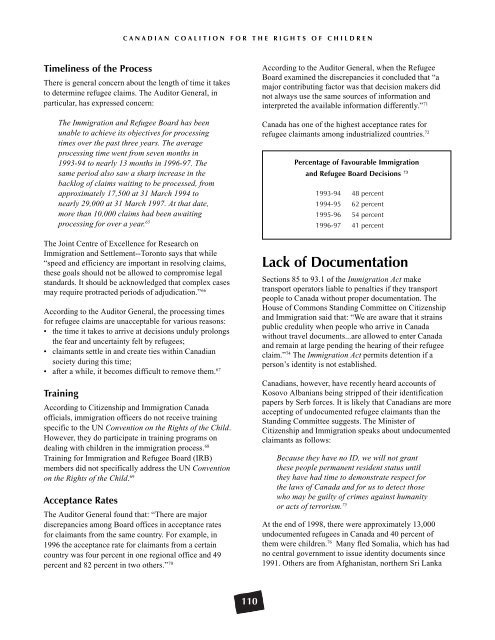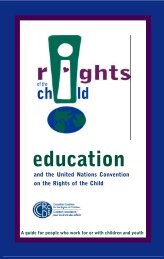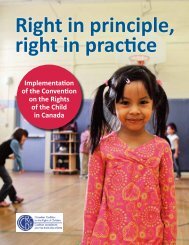Poste - Canadian Coalition for the Rights of Children
Poste - Canadian Coalition for the Rights of Children
Poste - Canadian Coalition for the Rights of Children
Create successful ePaper yourself
Turn your PDF publications into a flip-book with our unique Google optimized e-Paper software.
Timeliness <strong>of</strong> <strong>the</strong> Process<br />
C A N A D I A N C O A L I T I O N F O R T H E R I G H T S O F C H I L D R E N<br />
There is general concern about <strong>the</strong> length <strong>of</strong> time it takes<br />
to determine refugee claims. The Auditor General, in<br />
particular, has expressed concern:<br />
The Immigration and Refugee Board has been<br />
unable to achieve its objectives <strong>for</strong> processing<br />
times over <strong>the</strong> past three years. The average<br />
processing time went from seven months in<br />
1993-94 to nearly 13 months in 1996-97. The<br />
same period also saw a sharp increase in <strong>the</strong><br />
backlog <strong>of</strong> claims waiting to be processed, from<br />
approximately 17,500 at 31 March 1994 to<br />
nearly 29,000 at 31 March 1997. At that date,<br />
more than 10,000 claims had been awaiting<br />
processing <strong>for</strong> over a year. 65<br />
The Joint Centre <strong>of</strong> Excellence <strong>for</strong> Research on<br />
Immigration and Settlement--Toronto says that while<br />
“speed and efficiency are important in resolving claims,<br />
<strong>the</strong>se goals should not be allowed to compromise legal<br />
standards. It should be acknowledged that complex cases<br />
may require protracted periods <strong>of</strong> adjudication.” 66<br />
According to <strong>the</strong> Auditor General, <strong>the</strong> processing times<br />
<strong>for</strong> refugee claims are unacceptable <strong>for</strong> various reasons:<br />
• <strong>the</strong> time it takes to arrive at decisions unduly prolongs<br />
<strong>the</strong> fear and uncertainty felt by refugees;<br />
• claimants settle in and create ties within <strong>Canadian</strong><br />
society during this time;<br />
• after a while, it becomes difficult to remove <strong>the</strong>m. 67<br />
Training<br />
According to Citizenship and Immigration Canada<br />
<strong>of</strong>ficials, immigration <strong>of</strong>ficers do not receive training<br />
specific to <strong>the</strong> UN Convention on <strong>the</strong> <strong>Rights</strong> <strong>of</strong> <strong>the</strong> Child.<br />
However, <strong>the</strong>y do participate in training programs on<br />
dealing with children in <strong>the</strong> immigration process. 68<br />
Training <strong>for</strong> Immigration and Refugee Board (IRB)<br />
members did not specifically address <strong>the</strong> UN Convention<br />
on <strong>the</strong> <strong>Rights</strong> <strong>of</strong> <strong>the</strong> Child. 69<br />
Acceptance Rates<br />
The Auditor General found that: “There are major<br />
discrepancies among Board <strong>of</strong>fices in acceptance rates<br />
<strong>for</strong> claimants from <strong>the</strong> same country. For example, in<br />
1996 <strong>the</strong> acceptance rate <strong>for</strong> claimants from a certain<br />
country was four percent in one regional <strong>of</strong>fice and 49<br />
percent and 82 percent in two o<strong>the</strong>rs.” 70<br />
110<br />
According to <strong>the</strong> Auditor General, when <strong>the</strong> Refugee<br />
Board examined <strong>the</strong> discrepancies it concluded that “a<br />
major contributing factor was that decision makers did<br />
not always use <strong>the</strong> same sources <strong>of</strong> in<strong>for</strong>mation and<br />
interpreted <strong>the</strong> available in<strong>for</strong>mation differently.” 71<br />
Canada has one <strong>of</strong> <strong>the</strong> highest acceptance rates <strong>for</strong><br />
refugee claimants among industrialized countries. 72<br />
Percentage <strong>of</strong> Favourable Immigration<br />
and Refugee Board Decisions 73<br />
1993-94 48 percent<br />
1994-95 62 percent<br />
1995-96 54 percent<br />
1996-97 41 percent<br />
Lack <strong>of</strong> Documentation<br />
Sections 85 to 93.1 <strong>of</strong> <strong>the</strong> Immigration Act make<br />
transport operators liable to penalties if <strong>the</strong>y transport<br />
people to Canada without proper documentation. The<br />
House <strong>of</strong> Commons Standing Committee on Citizenship<br />
and Immigration said that: “We are aware that it strains<br />
public credulity when people who arrive in Canada<br />
without travel documents...are allowed to enter Canada<br />
and remain at large pending <strong>the</strong> hearing <strong>of</strong> <strong>the</strong>ir refugee<br />
claim.” 74 The Immigration Act permits detention if a<br />
person’s identity is not established.<br />
<strong>Canadian</strong>s, however, have recently heard accounts <strong>of</strong><br />
Kosovo Albanians being stripped <strong>of</strong> <strong>the</strong>ir identification<br />
papers by Serb <strong>for</strong>ces. It is likely that <strong>Canadian</strong>s are more<br />
accepting <strong>of</strong> undocumented refugee claimants than <strong>the</strong><br />
Standing Committee suggests. The Minister <strong>of</strong><br />
Citizenship and Immigration speaks about undocumented<br />
claimants as follows:<br />
Because <strong>the</strong>y have no ID, we will not grant<br />
<strong>the</strong>se people permanent resident status until<br />
<strong>the</strong>y have had time to demonstrate respect <strong>for</strong><br />
<strong>the</strong> laws <strong>of</strong> Canada and <strong>for</strong> us to detect those<br />
who may be guilty <strong>of</strong> crimes against humanity<br />
or acts <strong>of</strong> terrorism. 75<br />
At <strong>the</strong> end <strong>of</strong> 1998, <strong>the</strong>re were approximately 13,000<br />
undocumented refugees in Canada and 40 percent <strong>of</strong><br />
<strong>the</strong>m were children. 76 Many fled Somalia, which has had<br />
no central government to issue identity documents since<br />
1991. O<strong>the</strong>rs are from Afghanistan, nor<strong>the</strong>rn Sri Lanka




